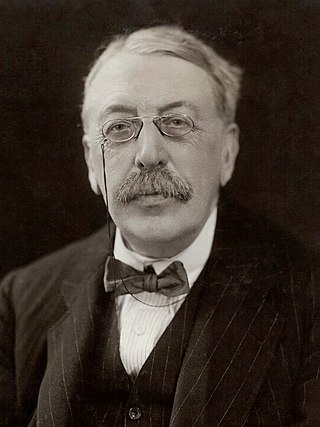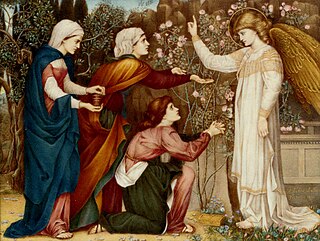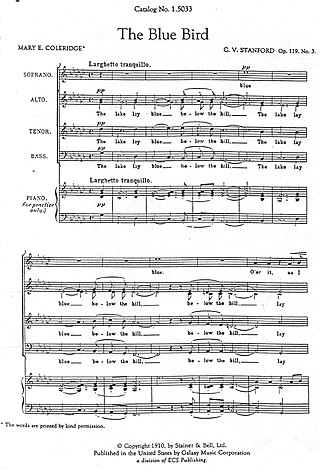Related Research Articles

Sir Charles Villiers Stanford was an Anglo-Irish composer, music teacher, and conductor of the late Romantic era. Born to a well-off and highly musical family in Dublin, Stanford was educated at the University of Cambridge before studying music in Leipzig and Berlin. He was instrumental in raising the status of the Cambridge University Musical Society, attracting international stars to perform with it.
Charles Stanford may refer to:

An organ scholar is a young musician employed as a part-time assistant organist at a cathedral, church or institution where regular choral services are held. The idea of an organ scholarship is to provide the holder with playing, directing and administrative experience. It is an important part of music-making in Christian worship and is strongly associated with, but is not limited to, Anglican church music in the United Kingdom, Australia and the USA.
"Crossing the Bar" is an 1889 elegiac poem by Alfred, Lord Tennyson. The narrator uses an extended metaphor to compare death with crossing the "sandbar" between the river of life, with its outgoing "flood", and the ocean that lies beyond death, the "boundless deep", to which we return.
The Mad Lover is a Jacobean stage play, a tragicomedy by John Fletcher. It was initially published in the first Beaumont and Fletcher folio of 1647. Fletcher's sole authorship was specified during the 17th century by his friend Sir Aston Cockayne. It displays Fletcher's distinctive pattern of stylistic and textual preferences throughout the text, so that his authorship is not questioned.
Much Ado About Nothing is an opera in four acts by Charles Villiers Stanford, to a libretto by Julian Sturgis based on Shakespeare's play Much Ado About Nothing. It was the composer's seventh completed opera.
The Cambridge University Musical Society (CUMS) is a federation of the university's main orchestral and choral ensembles, which cumulatively put on a substantial concert season during the university term.
Elegiac Ode, Op. 21, is a musical composition by British composer Charles Villiers Stanford (1852–1924) written and first performed in 1884. It is a four-movement work scored for baritone and soprano soloists, chorus and orchestra, Stanford's composition is a setting of Walt Whitman's 1865 elegy, "When Lilacs Last in the Dooryard Bloom'd", mourning the death of American president Abraham Lincoln. According to musicologist Jack Sullivan, Stanford's Elegiac Ode likely had reached a wider audience during Whitman's lifetime than his poems.

Three Latin Motets, Op. 38, is a collection of three sacred motets based on Latin texts for mixed unaccompanied choir by Charles Villiers Stanford, comprising Justorum animae, Coelos ascendit hodie and Beati quorum via. The texts come from different sources, and the scoring is for four to eight parts. They were published by Boosey & Co in 1905. The works, some of Stanford's few settings of church music in Latin, have remained in the choral repertoire internationally and are performed in liturgies and concert.
Symphony No. 1 in B-flat major was the first symphony composed by Charles Villiers Stanford an Irish composer, music teacher, and conductor. It was written in 1876 to compete for a prize offered by the proprietors of the Alexandra Palace. It came second out of 46 entries earning a prize of £5. The symphony was dedicated to the tenor Arthur Duke Coleridge who had been a friend of Stanford's at Cambridge. It was first played at The Crystal Palace in London in 1879 but was never published or performed again in Stanford's lifetime.
The National Song Book (1906) was a collection of British songs edited and arranged by Charles Villiers Stanford and published by Boosey & Co London. The book's publication followed Stanford's work editing three volumes on the collection made by George Petrie of the folk music of Ireland and he was supported in this by Arthur Somervell. It includes folk-songs, carols, and rounds with the choice reflecting the suggestions of Britain's Board of Education in their 1905 Blue Book of Suggestions. The aim of the work was to provide older school children with a "gateway to musical taste and knowledge". The songs included are from England, Ireland, Scotland and Wales and it is notable that they include songs of national rebellions against British rule but, as Knevett (2014) notes, these songs are included as a celebration of a more turbulent past presented as a stage in the development towards a more stable present. The arrangements in the book are presented in a simple fashion. It argues these are "merely intended to suggest sufficient harmony to make clear the tonality of each song, and in some cases to reinforce the characteristic rhythm, without distracting the attention of the singers from the melody itself". The book also notes the likelihood that English children, whilst they might find the Celtic scales and intervals difficult at first the "trouble involved will be amply repaid by the widening of their musical horizon, and by the more deeply poetical influence which Keltic music will exert upon the young mind".
Songs of the Sea is a cycle of five songs for baritone, male voice chorus, and orchestra, to poems by Henry Newbolt. It was composed by Charles Villiers Stanford, was premiered at the 1904 Leeds Festival, and was published as his Op. 91.

"Why seek ye the living?" is an anthem for four-part choir and organ by Charles Villiers Stanford, a setting of a passage from the Gospel of Luke, related to Easter.

The Service in B-flat major, Op. 10, is a collection of Anglican church music by Charles Villiers Stanford for mixed choir and organ containing the canticles for each of the principal services of the Anglican Church. Stanford set the traditional liturgical texts in English in 1879 when he was the organist of Trinity College, Cambridge. They were published by Novello in 1902. Stanford orchestrated the work in 1903, with additional organ.

The Veiled Prophet is an 1877 romantic opera in three acts by Charles Villiers Stanford to a libretto by William Barclay Squire based on the 1817 poem "The Veiled Prophet of Khorassan" by Thomas Moore. It was first performed in Hanover in 1881, in German. Its sole British performance was given in Italian at the Royal Opera House, London, in 1893, and its first performance in its original English version was at the Wexford Festival in 2019.

Charles Villiers Stanford's Violin Sonata No. 2 in A major, Op. 70, was composed around 1898. Performed only once during the composer's lifetime, the sonata remained unpublished until 2006.

The Violin Sonata No. 1 in D major, Op. 11, was composed by Charles Villiers Stanford in 1877, shortly after the composer completed his studies in Germany. It was one of his first pieces of chamber music, preceded only by his A major cello sonata. First performed the year it was composed, the sonata was published in 1878 by Ries & Erler in Germany, with a dedication to violinist Ludwig Straus.
"Ye Choirs of New Jerusalem" or "Sing, Choirs of New Jerusalem" is an English Easter hymn by Robert Campbell. It is a 19th-century translation of the medieval Chorus novae Ierusalem, attributed to Fulbert of Chartres. The text's primary focus is the Resurrection of Jesus, taking the theme of Jesus as triumphant victor over death and deliverer of the prisoners from Hell.

The Blue Bird is a partsong composed by Charles Villiers Stanford in 1910. It is set to the words of L'Oiseau Bleu, a poem by Mary Elizabeth Coleridge, which depicts a bluebird in flight over a lake. It is written for SAATB choir: soprano, divided altos, tenor and bass. "The Blue Bird" is the third of Stanford's Eight Part Songs which are all settings of texts by Coleridge. It was widely performed by choral societies in England during Stanford's life and is considered one of the best English partsongs ever written. It has been recorded by ensembles including The Cambridge Singers, Oxford Camerata, Tenebrae, and the Gabrieli Consort.

The Queen's Platinum Jubilee Concert was an Australian concert held on 6 August 2022 at St John's Cathedral, Brisbane that celebrated the Platinum Jubilee of Elizabeth II, Queen of Australia. The concert was directed by composer Alexander Voltz and organist Andrej Kouznetsov.
References
- ↑ Charles Villiers Stanford: Man and Musician Jeremy Dibble · 2002